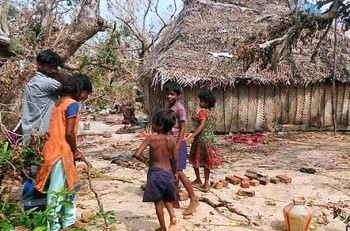Alice Barwa

Adivasi children playing Athkheliya in a village of MP. Picture credit - Bhanu Prakash Meda
SCHOOL FOR ADIVASI CHILDREN
My children will forget our ancestors,
celebrating our oppressors’ history of oppression.
Under the bright lights of oppression,
our bloodshed will become just
another red colour in their festivities.
My children will not be taught about Adivasi rebellion
For we rebelled against all Dikus,
Savarnas who killed then and who kill now.
We rebelled for an independence we are yet to achieve.
My children will be taught shame,
shame on the colour of their skin,
shame on the shape of their nose or mouth,
shame on their name, shame and their heritage,
shame on how they eat, speak, dress,
shame, shame, shame.
In “neutral” textbooks,
taught by “apolitical” teachers
in classrooms meant to homogenise them
under one nation, one language, one people.
My children know or will learn Kurukh, Sadri, Hindi, English,
language after language, many without context
Yet none enough for the Dikus,
those who wish to exploit
and humiliate us with their cultural capital
in the schools built for them.
My children learn to live with our ecology,
and our survival is resistance itself,
life which is retold and sold as “sustainable”
Yet we will be measured by cities
built of concrete, with the coal of our land,
the water of our bodies, and the blood of our ancestors.
My children will be taught fear,
merit weighed by a self-proclaimed casteless society,
our knowledge imprisoned
like our falsely accused brothers; our sisters sold as bonded labourers
cursed or glorified by Dikus.
My children will be taught the oppressors’ “Education”,
that speaks of fancy teacups
with tea leaves from Assam and Bengal,
the place where our brethren were once traded
and are still exploited.
My children will be taught silence.
My children will speak.
My children will be silenced.
(The poem was written in English. The poet’s mother tongue is Kurukh.)

Issue 122 (Jul-Aug 2025)
-
MANAGING EDITOR'S NOTE
- GSP Rao: Managing Editor’s Note
-
EDITORIAL
- Gopika Jadeja & Kanji Patel: Editorial
-
ARTICLES
- Hariram Meena: Adivasi Poetry in Hindi
- Lakshmi Priya N: The Rise of Adivasi Poetry in Kerala
- Samarth Singhal: Bhajju Shyam's Creation - Adivasi Art in the Anglophone Picture Book
- Sangeeta Dasgupta and Vikas Kumar: Revisiting the Archive, Reframing the Adivasi - Birsa Munda and Sido Murmu
- T Keditsu: A Poet's Reflection on Poetry in English from North East India
-
INTERVIEW
- Gopika Jadeja: Interview with Poonam Vasam
-
REVIEW
- Anjali Purohit: Bless Us All by Veera Rathod, translated by L S Deshpande
-
ADIVASI POETRY FROM ACROSS INDIA
-
1. SOUTHERN INDIA
- 'Odiyan' Lakshmanan
- Dhanya Vengacheri
- Lijina Kadumeni
- Prakash Chenthalam
- Sukumaran Chaligadha
- Suresh M Mavilan
-
2. WESTERN INDIA
- Babu Sangada
- Bakula Chaudhari
- Bharat Daundkar
- Hariram Meena
- Jitendra Vasava
- Kusumtai Alam
- Manish Meena
- Rekha Kharadi
- Ushakiran Atram
- Vajesingh Pargi
- Veera Rathod
-
3. EASTERN AND NORTH-EASTERN INDIA
- Anil Kumar Boro
- Anju Basumatary
- Anpa Marndi
- Ayinam Ering
- Bikash Roy Debbarma
- Desmond Kharmawphlang
- Emisenla Jamir
- Esther Syiem
- Jiwan Namdung
- Kavita Karmakar
- Kynpham Sing Nongkynrih
- Ponung Ering Angu
- Rajen Kshetri
- Sameer Tanti
- Snehlata Negi
- Streamlet D’khar
- T Keditsu
- Uttara Chakma
- Yumlam Tana
-
4. NORTH AND CENTRAL INDIA
- Alice Barwa
- Anuj Lugun
- Basavi Kiro
- Bhanuprakash Singh Meda
- Chandramohan Kisku
- Hemant Dalapati
- Ishan Marvel
- Naseem Akhtar
- Nirmala Putul
- Parvati Tirkey
- Poonam Vasam
- Satish Loppa
-
1. SOUTHERN INDIA
